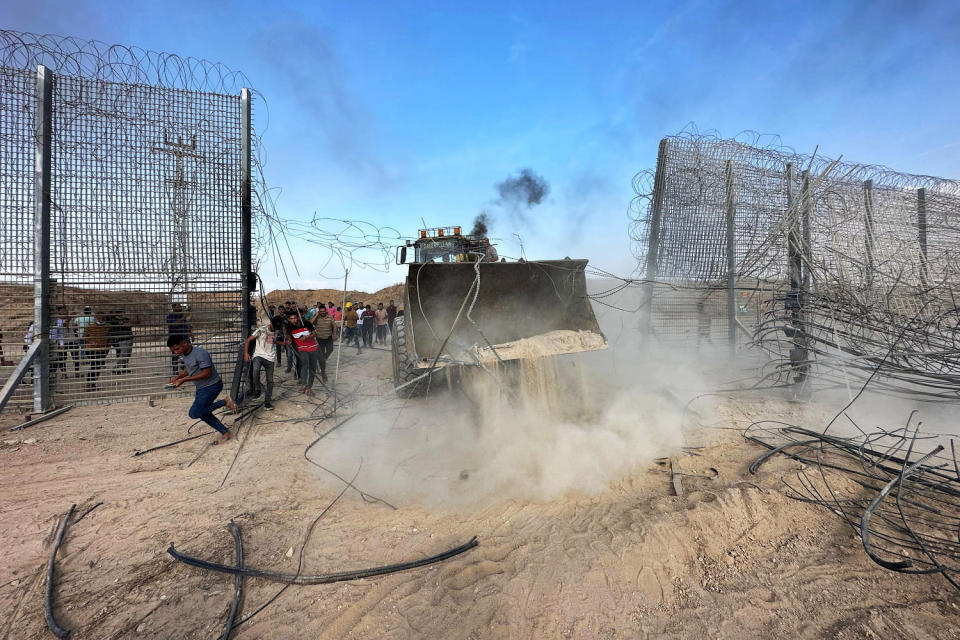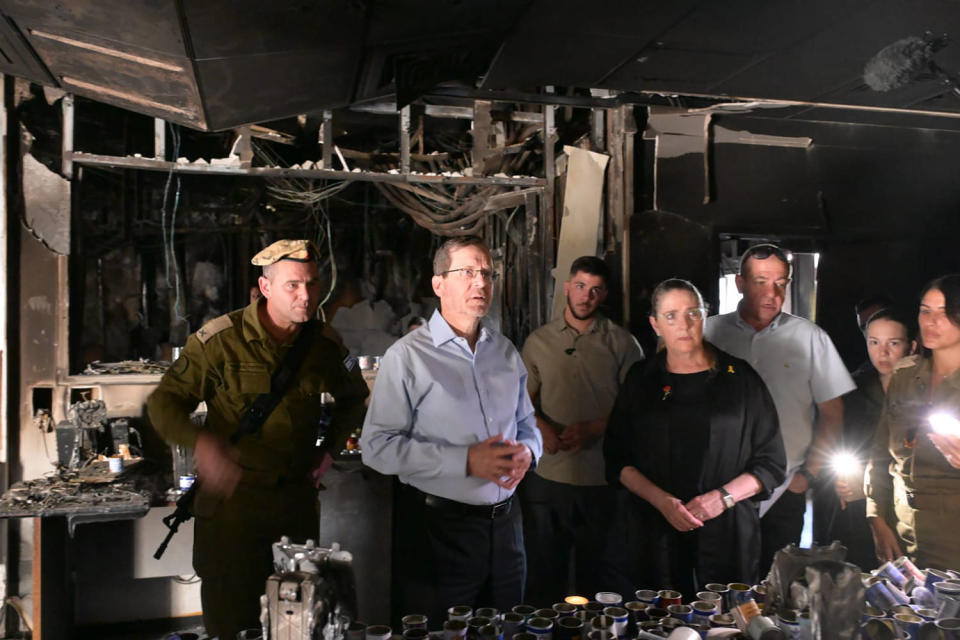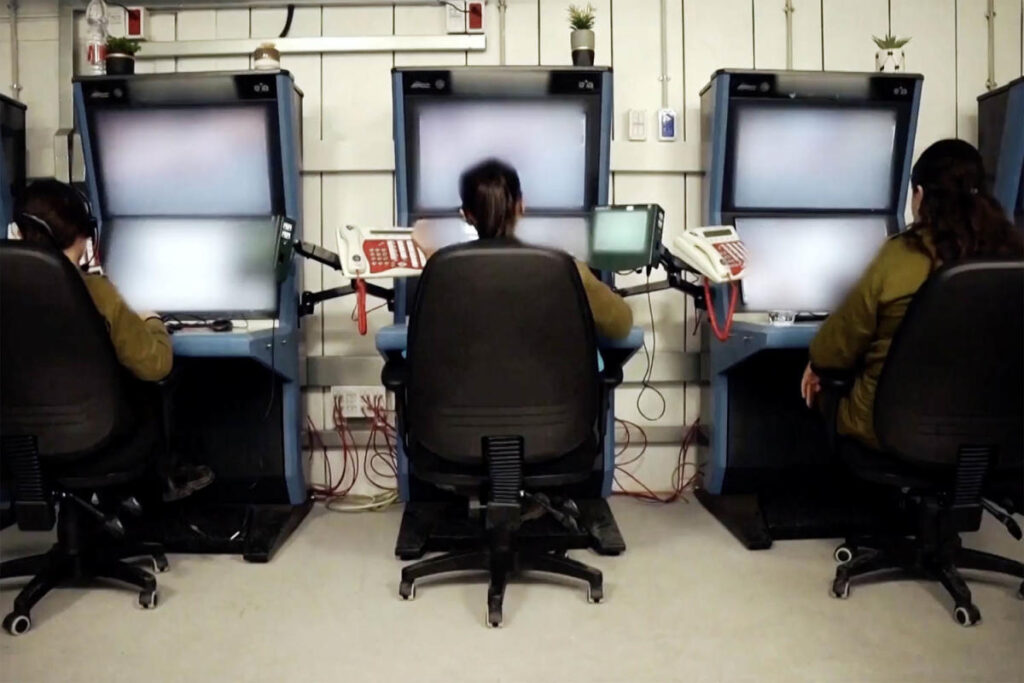TEL AVIV – They were the eyes of Israel on the border with Gazabut former soldiers from a military observation unit are speaking out in advance of their warnings about suspected Hamas activities October 7 terrorist attacks were repeatedly ignored. A year later, they are still looking for answers.
“If I had been appreciated a little more — not a lot, but a little — things might have turned out differently,” Roni Lifshitz, one of the former observers, told NBC News last month. “It’s anger and sadness, mostly frustration, because I was there and no one listened to me.”
Lifshitz, 21, was part of the Israeli Defense Forces‘unit 414 stationed at the Nahal Oz Military Base on the border with Gaza. Soldiers in the all-female team of field observers, most of whom were only 19 or 20 years old and performing their mandatory military service, spent hours glued to surveillance camera footage, searching for threats.
In the months leading up to Oct. 7, Lifshitz said she began noticing unusual activity. Truckloads of Hamas militantswhich appeared to be special forces because they were all dressed in black, driving within 300 meters of the fence, in a “combat patrol,” she said. After they stopped, she said they would carefully scan the Israeli positions while talking to each other.


On another occasion, she said she saw militants using a “model of an Israeli tank that they had built to train how to kidnap soldiers. They actually rehearsed scenarios that happened on October 7,” she said.
Lifshitz said she reported all these events to the official chain of command, but the response was silent. “Nobody updated me. No one has said to me, ‘Roni, what you reported is being processed,’ or ‘To be clear: they are doing something about it, they are working on it, they have heard about it.’ No one said anything to me,” she said.
On the morning of the attacks, Lifshitz was training in Jerusalem.
Hamas militants stormed the Nahal Oz base and fifteen of Lifshitz’s colleagues – all young women like her – were killed in the attack. Another seven were towed to Gaza. Video taken on the day of the attack shows several young women covered in blood. Most wore sweatpants and the clothes they slept in. Some were later seen on the streets of Gaza being stuffed into jeeps and trucks.
One of Lifshitz’s colleagues, Ori Megidianwas rescued weeks after the attacks, and another, Noa Marcianawas killed at the Al-Shifa Hospital in northern Gazathe Israeli army said. Five are still in captivity.


Lifshitz said she tried to maintain a positive attitude while working at a shoe store, but she cried herself to sleep every night, haunted by the ever-present guilt that she had survived.
“Everything I do comes with the feeling of: ‘Why me and not them? Why am I different from them? Why were they killed and not me?’”
She and other surviving members of Unit 414 are also looking for answers.
“I want an answer to just one question,” she said. “Who received the information and did not order to do something about it? Who turned a blind eye and who is responsible for this?”
When asked whether the observers’ warnings were heeded or ignored, the Israeli military told NBC that it is currently focusing on the fight against Hamas and that “these types of questions will be investigated at a later stage. ”
After a meeting in July between the observers, their families and those of Israel Prime Minister Benjamin Netanyahuhis office said in a statement that he had heard their requests for an investigation and promised that “the matters would be thoroughly reviewed and lessons would be learned at all levels.”
During a visit to Nahal Oz, Israeli President Isaac Herzog said on Tuesday that it was the site of “a terrible massacre.”
“I sincerely hope that the investigation will be published fully and comprehensively, to shed light on everything that happened. It will not change reality, but it is good that we know the truth in order to learn lessons from it,” said Herzog.
But so far Israel has not launched an official investigation, despite pleas from the families of observers and other victims of the attacks.
Undeterred, the surviving members of Unit 414 made their concerns public.
In September, Lifshitz and two other former soldiers, Amit Yerushalmi and Margaret Weinstein, took part in an unofficial civilian investigative committee that gathered evidence of intelligence failures surrounding the Hamas attacks, which left 1,200 people and about 240 people taken hostage. to Israeli parties. The Israeli offensive in Gaza has since killed more than 41,000 people, according to health officials in the enclave.
Weinstein testified about equipment malfunctions on the base, including surveillance cameras that had been dropped or malfunctioned. Yerushalmi also claimed that the pattern of suspected Hamas activity increased in the weeks leading up to the attack.


Both echoed Lifshitz’s claims that their claims were ignored.
The committee was founded by Ofer Rosenbaum and Haim Rubenstein as part of a promise Rubenstein made to Eyal Eshel, the father of 19-year-old Roni Eshel, a unit observer who was killed on the base.
Varda Alshech, a retired judge, heads the committee. Other members include retired Major General Eyal Ben-Reuven, the retired brigadier general. General General Yehudit Grisaro and Shlomo Aharonishki, who served as the High Commissioner of the Israeli Police between 2001 and 2008. Raphael Ben-Sheetrit, the former mayor of the northern city of Beit She’an, is also on the committee.
“We are looking for an answer for the families: what really happened?” said Rubenstein, who, like Rosenbaum, worked in crisis management before the attacks. “If the army failed, I have to understand what happened in the army. If the government failed, I need to understand what happened there.”
Despite receiving no government support, the commission is continuing the investigation and plans to issue a preliminary report next month.
“If Israeli citizens don’t want these answers, how can we ensure this never happens again,” Rosenbaum said of their mission.
Other former and current soldiers have also testified before their committee, as have members of the intelligence community, journalists, former prime ministers and other government officials.
In August, opposition leader Yair Lapid testified that two months before the October 7 attacks, he had participated in a military intelligence briefing in which Netanyahu received detailed warnings that Hamas had detected a weakness, division and a loss of military competence in Israel.
Netanyahu seemed “bored and indifferent,” he said.


Danny Yatom, the former head of Israel’s Mossad intelligence service, also testified on September 10.
Speaking to NBC News at the commission’s office in Tel Aviv on the day of his testimony, Yatom said he had no explanation for Israel’s security shortcomings, but said that all layers of defenses in Israel, in his assessment, “collapsed at the same time.” .” time.”
He added that Netanyahu “is responsible because he got an early warning, even if it wasn’t the exact date, the exact location. He didn’t pay attention to it the way the Prime Minister should pay attention to it.”
Today, Lifshitz wears a necklace with a small photo of her friend Shahaf Nissani, a young woman with a large mass of curly, auburn hair running around her face and down her neck. She was Lifshitz’s best friend and a fellow observer, who was also murdered on the base.
When customers in her shoe store ask her about the necklace, she talks about her friend and then tries to change the subject.
“People can see that I’m hiding my emotions,” she said. “I laugh, joke and seem happy and go out, but my heart is broken, black. There is no soul, nothing.”
This article was originally published on NBCNews.com







